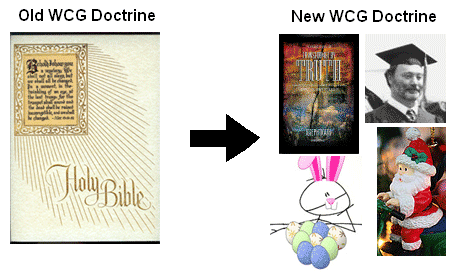WCG and Christmas: “Jesus is the Reason for the Season”?
TRANSFORMED FROM TRUTH
In his latest monthly letter, WCG’s Joseph Tkach wrote:
December 2007
Dear Brothers and Sisters in Christ,
What is it that makes Christmas a sacred season instead of just a holiday?…
Someone once said, “Jesus is the reason for the season.” That’s certainly true, and in fact, Jesus is the reason for every season…
May your Christmas be blessed and meaningful!
Comments by COGwriter
No, Jesus is NOT the actual reason for what is now called the Christmas season.
Partying is the reason.
Jesus’ name was simply added to this party to discourage direct worship of pagan deities which was happening among those that were becoming affiliated with the emerging Greco-Roman confederation of churches.
By the beginning of the third century a lot of complaints that Greco-Roman professors of Christ could not resist the pagan celebrations held for Saturn and New Year’s were recorded.
Notice what Tertullian wrote around 200 A.D.:
The Minervalia are as much Minerva’s, as the Saturnalia Saturn’s; Saturn’s, which must necessarily be celebrated even by little slaves at the time of the Saturnalia. New-year’s gifts likewise must be caught at, and the Septimontium kept; and all the presents of Midwinter and the feast of Dear Kinsmanship must be exacted; the schools must be wreathed with flowers; the flamens’ wives and the aediles sacrifice; the school is honoured on the appointed holy-days. The same thing takes place on an idol’s birthday; every pomp of the devil is frequented. Who will think that these things are befitting to a Christian master, unless it be he who shall think them suitable likewise to one who is not a master? (Tertullian. On Idolatry, Chapter X).
But, however, the majority (of so-called Christians) have by this time induced the belief in their mind that it is pardonable if at any time they do what the heathen do, for fear “the Name be blasphemed”…To live with heathens is lawful, to die with them is not. Let us live with all; let us be glad with them, out of community of nature, not of superstition. We are peers in soul, not in discipline; fellow-possessors of the world, not of error. But if we have no right of communion in matters of this kind with strangers, how far more wicked to celebrate them among brethren! Who can maintain or defend this?…By us,…the Saturnalia and New-year’s and Midwinter’s festivals and Matronalia are frequented–presents come and go–New-year’s gifts–games join their noise–banquets join their din! Oh better fidelity of the nations to their own sect, which claims no solemnity of the Christians for itself! (Chapter XIV).
But “let your works shine,” saith He; but now all our shops and gates shine! You will now-a-days find more doors of heathens without lamps and laurel-wreaths than of Christians. What does the case seem to be with regard to that species (of ceremony) also? If it is an idol’s honour, without doubt an idol’s honour is idolatry. If it is for a man’s sake, let us again consider that all idolatry is for man’s sake; let us again consider that all idolatry is a worship done to men, since it is generally agreed even among their worshippers that aforetime the gods themselves of the nations were men; and so it makes no difference whether that superstitious homage be rendered to men of a former age or of this. Idolatry is condemned, not on account of the persons which are set up for worship, but on account of those its observances, which pertain to demons (Chapter XV).
What Tertullian seems to be saying is that observing mid-winter celebrations make Christians appear to be followers of pagan gods, and since the pagans would not intentionally celebrate days considered by many to be Christian, Christians should not celebrate days that are honored by the heathen. Specifically, he felt that those who profess Christ should not celebrate Saturnalia, New Year’s, or other pagan days, as even the observance is a form of idolatry (click here for an article titled Is January 1st a Date for Christians Celebrate?).
Since the modern Christmas celebration is at the same time as the old Gentile Saturnalia holiday (and with many of the same elements, like wreaths and gift-giving), it is clear that Tertullian is condemning these practices by stating that those that keep it are of the pagan god Saturn. He also wrote against winter giving:
…gifts like those you have in the Saturnalia! (Tertullian. De Fuga in Persecutione, Chapter 13).
The truth is that the partying could not be controlled because these so-called Christians were never truly followers of Christ.
In the fourth century both Rome (354 A.D.) and Constantinople (395) decided to formally recognize December 25th (the date of the sun-god Mithra’s birthday) as the day to celebrate Christ’s birth.
And the Saturnalia festivities were simply continued with wreaths, gift giving, and sadly, now the name of Christ.
And that is really why people celebrate the Christmas season.
The above and more is documented in the article What Does the Catholic Church Teach About Christmas and the Holy Days?
Perhaps another article that may be of interest would be Did Early Christians Celebrate Birthdays?
 |
Tweet |
|